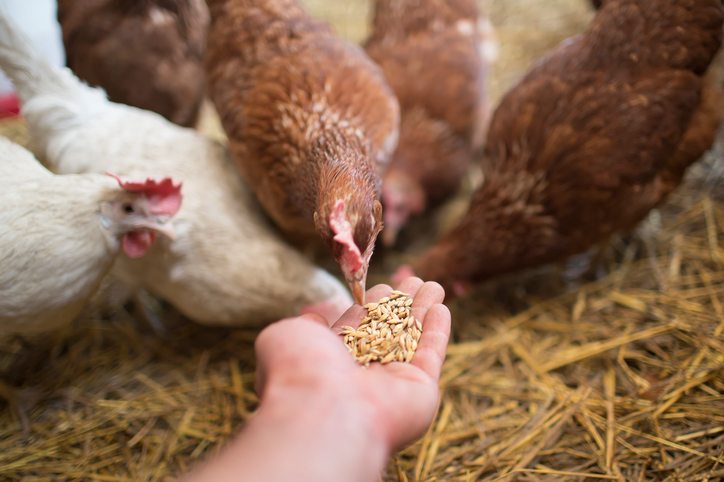Welcome to our big approved guide on what to feed a baby chicken. If you are a poultry enthusiast or a beginning chicken keeper, this article is your one-stop resource for ensuring your baby chicks grow into healthy, thriving adult chickens.
Feeding baby chicks the right food is crucial for their development and overall health. Let’s dive into everything you need to know about feeding baby chickens, ensuring their diet is nutritious and well-balanced.

Introduction to Feeding Baby Chickens
Raising baby chickens can be a delightful experience, but it comes with its responsibilities. Feeding your baby chicks properly is essential for their survival and growth. In this guide, we will cover the basics of chick nutrition, types of feeds available, and tips for keeping your chicks healthy and happy.

The Importance of Proper Nutrition
Why Nutrition Matters
Proper nutrition during the early stages of a chick’s life can determine its future health and productivity. Nutrients like proteins, vitamins, and minerals are vital for muscle development, feather growth, and a strong immune system.
Consequences of Poor Nutrition
Feeding your baby chickens an inadequate diet can lead to numerous health problems, such as weak bone structure, poor feathering, and even increased susceptibility to diseases. It’s vital to provide a balanced diet to ensure their well-being.

Types of Chicken Feed
Commercial Chick Starter Feed
Commercial chick starter feeds are specifically formulated to meet the dietary needs of baby chickens. Look for a starter feed with a protein content of around 18-20%. This feed comes in medicated and non-medicated varieties to keep your chicks healthy.
Homemade Feed Options
While commercial feeds are convenient, some prefer to make their own. Ingredients such as cornmeal, ground oats, soy meal, and vitamin supplements can be mixed to create a nutritious blend. Ensure the mix meets the protein and nutrient requirements of your chicks.

Essential Nutrients for Baby Chickens
Protein
Protein is crucial for growth and development. Chickens need a high-protein diet, especially during their first weeks. Aim for feed with at least 18% protein.
Vitamins
Vitamins A, D, and E are particularly important. These vitamins contribute to healthy skin, vision, and bone development. Ensure the feed includes a variety of vitamins for overall health.
Minerals
Calcium and phosphorus are necessary for bone development. Appropriate levels of these minerals will ensure your chicks grow strong and healthy.
Feeding Tips and Techniques
Feeding Frequency
Feed your chicks continuously during the first week. After that, they can be fed several times a day. Ensure they always have access to clean water.
Avoid Overfeeding
While its important to provide enough feed, overfeeding can lead to issues such as obesity and poor liver health. Monitor their intake and adjust as necessary.
Common Mistakes to Avoid
Feeding Adult Chicken Feed
Do not feed baby chicks adult chicken feed. The nutrient composition is different, and chicks require a specially formulated starter feed.
Ignoring Cleanliness
Dirty feeding areas can lead to bacterial infections. Keep feeding and water areas clean to prevent diseases.
Introducing Treats and Supplements
Safe Treats
Introduce treats like small grains and fruits gradually. Avoid giving them in excess to ensure a balanced diet.
Supplements
Nutritional supplements like probiotics and electrolytes can be beneficial, especially if chicks are under stress or recovering from illness.
Transitioning to Grower Feed
At around 6 weeks of age, chicks can start transitioning to grower feed. This feed has slightly less protein but more calcium to support their growing bones.
Conclusion
Feeding baby chickens is a delightful yet responsible task. Providing the right nutrition ensures your chicks grow healthy and strong. Follow this big approved guide, and your chicks are set for a tremendous start in life.
For more tips on raising healthy chickens, check out chickens for the backyard.
Faq
At What Age Can Chicks Eat Treats?
Chicks can start eating treats like small grains and fruits at around 4 weeks, but introduce them gradually.
How Often Should I Provide Fresh Water?
Fresh water should be available at all times. Clean the water containers daily to prevent bacteria build-up.
Can I Use Homemade Feed?
Yes, but ensure it meets the nutritional needs of chicks, primarily focusing on adequate protein and vitamins.
As an Amazon Associate, I earn from qualifying purchases.









